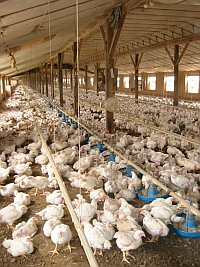A study of mid-Atlantic poultry farms that switched to organic practices shows significantly lower levels of drug-resistant enterococci bacteria that can spread to humans. The findings by researchers from University of Maryland, Johns Hopkins University, and Pennsylvania State University appear online in the journal Environmental Health Perspectives.
The research, led by Amy Sapkota with the Maryland Institute for Applied Environmental Health, investigated the impact of removing antibiotics from U.S. poultry farms by studying 10 conventional and 10 newly organic large-scale poultry houses in the mid-Atlantic region. The team tested for the presence of enterococci bacteria in poultry litter, feed, and water, and tested its resistance to 17 common anti-microbial drugs.
Enterococcus is a type of bacteria often found in the feces of people and many animals, including poultry. The Enterococcus faecalis and Enterococcus faecium variations occasionally cause disease in humans, most commonly urinary tract and wound infections. Enterococci are also among the most common antibiotic-resistant bacteria, including those found in hospitals.
The researchers found all farms tested positive for the presence of enterococci in poultry litter, feed, and water, but the newly organic farms had a significantly lower prevalence of antibiotic-resistant enterococci. For example, two-thirds (67%) of Enterococcus faecalis recovered from conventional poultry farms were resistant to erythromycin, while less than two in 10 (18%) of Enterococcus faecalis from newly organic poultry farms were resistant to this antibiotic.
The team found sharp differences in the levels of multi-drug resistant bacteria — defined as organisms resistant to three or more antimicrobial classes — on the newly organic farms. Multi-drug resistant bacteria are of particular public health concern because they can be resistant to all available antibiotics, and are, therefore, very difficult to treat if contracted by an animal or human.
The findings indicate 42 percent of Enterococcus faecalis from conventional farms were multi-drug resistant, compared to only 10 percent from newly organic farms. More than eight in 10 (84%) of Enterococcus faecium bacteria from conventional farms were multi-drug resistant compared to less than two in 10 (17%) of those from newly organic farms.
Sapkota says, “We were surprised to see that the differences were so significant across several different classes of antibiotics even in the very first flock of birds that was produced after the transition to organic standards.” The authors note that this study is the first to demonstrate lower levels of drug-resistant bacteria on newly organic farms in the U.S., which supports suggestions that removing antibiotics from large-scale U.S. poultry farms can result in reductions in antibiotic resistance for some bacteria.
Read more: U.S. Meat, Poultry Found with Drug-Resistant Staph Bacteria
* * *


 RSS - Posts
RSS - Posts
You must be logged in to post a comment.